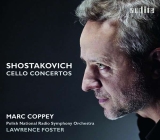 Dmitri Shostakovich: Cellokonzerte Nr. 1 & 2; Marc Coppey, Polish National Radio Symphony Orchestra (NOSPR), Lawrence Foster; 1 CD Audite 97.777; Aufnahme 2020, Veröffentlichung 08/01/2021 (60'12) - Rezension von Remy Franck
Dmitri Shostakovich: Cellokonzerte Nr. 1 & 2; Marc Coppey, Polish National Radio Symphony Orchestra (NOSPR), Lawrence Foster; 1 CD Audite 97.777; Aufnahme 2020, Veröffentlichung 08/01/2021 (60'12) - Rezension von Remy Franck
Shostakovich hat seine beiden Cellokonzerte für Mstislav Rostropovich geschrieben. Auch wenn das erste (op. 107 aus dem Jahre 1959) virtuoser ist als das zweite, das während eines Sanatoriumsaufenthalts des Komponisten im April 1966 entstand, so sind beide Werke von bemerkenswerter Tiefe und einer großen emotionalen Dichte.
Marc Coppey startet das 1. Konzert ungemein gut gelaunt und frei von Schärfen, die andere Interpreten, Dirigenten inklusive, dieser Musik gegeben haben. Das folgende Moderato bleibt in meditativem Charakter von großer Zartheit und menschlicher Wärme, die auch Lawrence Foster im Orchester betont. Wir sind hier weit entfernt von kargen und düsteren Stimmungen anderer Interpretationen. Die Kadenz wird genau so wenig geschärft und eher lyrisch ausgespielt, verliert aber auch bei dieser Lesart nichts an emotionaler Wirkung. Coppey spielt ohne jede Verbissenheit, ohne jene dramatischen Gesten, mit denen andere Cellisten die Kadenz zum Drama machen. Auch das Finale wird gelöst und quasi burlesk ausgespielt, ohne Schärfe, ohne Aufschreien und bekommt so einen durchwegs positiven Charakter.
Und es tut gut, dieses Konzert mal wieder aus einer solchen Perspektive zu hören, ohne aufgewühltes Seelendrama. Ohne Sarkasmus und beißende Ironie und dennoch auch nicht mit bloßer Virtuosität, die elegant jede wie auch immer geartete Gefühlswelten umschiffen würde.
Die Musik des 2. Cellokonzerts muss vom Interpreten nicht noch zusätzlich belastet werden, und das haben sich Coppey und Foster zu Herzen genommen. Sie spielen zwar einerseits das Lyrische, andererseits das Dramatische voll aus, aber sie pointieren es nicht. Wo immer es möglich ist, legen sie Wert auf Nachdenklichkeit, auf Verinnerlichung, aber ohne verbohrten Sarkasmus, ohne jenen düsteren Biss, der das Konzert so ergreifend machen kann. Haben die Interpreten dieser Aufnahme also gefehlt, an Shostakovich vorbei gespielt? Ich glaube nicht. Sie haben andere Gefühlswelten betont und gerade das ist so interessant. Die Intensität der Musik ist auch so stark genug um den Hörer zu packen und ihm neue Aspekte in Shostakovichs Konzerten zu zeigen. Nichts klingt falsch hier, nichts manieriert.
Shostakovich wrote his two cello concertos for Mstislav Rostropovich. Even if the first (op. 107 from 1959) is more virtuosic than the second, which was written during the composer’s stay in a sanatorium in April 1966, both works are of remarkable depth and enormous emotional density.
Marc Coppey starts the First Concerto in an uncommonly good mood and free of the sharpness that other interpreters, conductors included, have given this music. The following Moderato remains in meditative character of great tenderness and human warmth, also emphasised by Lawrence Foster in the orchestra. We are far from the barren and sombre moods of other interpretations. The cadenza is just as little sharpened and rather lyrically played, but loses nothing of its emotional impact. Coppey plays without any doggedness, without those dramatic gestures with which other cellists turn the cadenza into a drama. The finale, too, is played in a relaxed and quasi burlesque manner, without sharpness, without any screaming and thus acquires a thoroughly positive character.
And it is good to hear this concerto from such a perspective, without the emotional drama, without sarcasm and biting irony, and yet not with mere virtuosity, which would elegantly ignore any kind of emotion.
The music of the Second Cello Concerto does not need to be additionally burdened by the interpreter, and Coppey and Foster have taken this to heart. Their performance is lyrical and also dramatic, but they do not accentuate it. Wherever possible, they emphasise thoughtfulness and introspection, but without obdurate sarcasm, without that sombre bite that can make the concerto so poignant. So did the performers of this recording misunderstand Shostakovich? I don’t think so. They have emphasised other feelings and that is precisely what is so interesting. The intensity of the music is strong enough to grab the listener and show him new aspects of Shostakovich’s concertos, without giving it a false or mannered character.






















